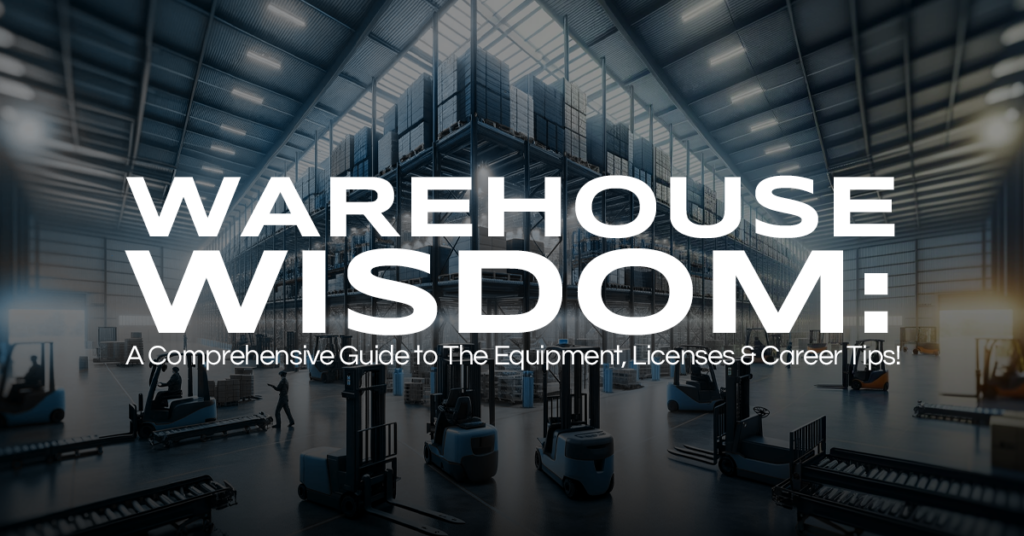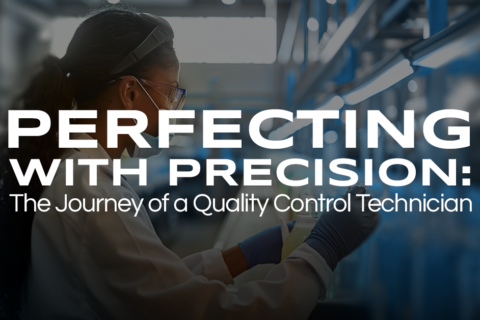
The Backbone of Modern Warehousing
In the intricate world of warehousing, the seamless movement and storage of goods are critical to maintaining efficient supply chains. This efficiency relies heavily on a variety of specialized equipment operated by skilled personnel. From forklifts to conveyor systems, each piece of equipment plays a vital role. This article provides a comprehensive guide to the different types of warehouse equipment, the specific licenses and permits required for their operation, and how to qualify for these essential positions. Let’s dive into it!

1. Forklifts: The Cornerstone of Material Handling
Overview: Forklifts are indispensable in warehouses for lifting and transporting heavy loads. They come in various types, including counterbalance forklifts, reach trucks, and pallet stackers.
Types of Forklifts:
- Counterbalance Forklifts: The standard type, ideal for general lifting tasks.
- Reach Trucks: Designed for narrow aisles and high shelves.
- Pallet Stackers: Used for stacking pallets in tight spaces.
Licenses and Permits:
- Forklift Operator License: Operators must complete a certified training program and pass both written and practical exams.
- OSHA Certification: The Occupational Safety and Health Administration (OSHA) requires all forklift operators in the United States to be certified. This involves completing a training program that covers safety protocols, machine operation, and maintenance.
Qualifications:
- Training Programs: Enroll in an accredited forklift training program. These typically include classroom instruction and hands-on training.
- Certification Exams: Pass the written and practical exams to obtain your forklift operator license.
- Renewal: Forklift certifications must be renewed every three years. Refresher courses are often required.

2. Pallet Jacks: Simplifying Short-Distance Transport
Overview: Pallet jacks are essential for moving pallets within a warehouse. They come in manual and electric versions.
Types of Pallet Jacks:
- Manual Pallet Jacks: Operated by hand, suitable for lighter loads.
- Electric Pallet Jacks: Battery-powered, ideal for heavier loads and longer distances.
Licenses and Permits:
- Operator Training: While a specific license may not be required for manual pallet jacks, training on safe operation is essential.
Qualifications:
- Basic Training: Complete a training program covering the operation and safety of pallet jacks.
- Certification: Obtain certification for electric pallet jacks by passing the required exams.
- Physical Fitness: Be physically fit, as the job involves manual labor and handling heavy loads.
3. Electric Pallet Jacks: Powering Productivity
Overview: Electric pallet jacks enhance efficiency by reducing the physical effort needed to move heavy pallets.
Benefits:
- Increased Efficiency: Reduces physical strain and increases productivity.
- Enhanced Safety: Includes features like brakes and automatic shut-off mechanisms.
Licenses and Permits:
- Electric Pallet Jack Certification: Requires completing a training program that includes both theoretical and practical components.
Qualifications:
- Specific Training: Complete specialized training for electric pallet jacks.
- Certification Exam: Pass the certification exam to prove competency.
- Technical Skills: Basic understanding of battery maintenance and troubleshooting.

4. Moffett: The Mobile Loading Solution
Overview: A Moffett is a truck-mounted forklift used for unloading heavy items directly from the delivery truck, usually a flatbed trailer.
Benefits:
- Versatility: Useful in various environments, including construction sites and rural areas.
- Efficiency: Speeds up unloading without the need for a specialized loading dock.
Licenses and Permits:
- Moffett Operator Certification: Requires training in both forklift operation and the mounting/dismounting process.
- Commercial Driver’s License (CDL): Operators tend to have a CDL since these specific forklifts are mounted directly to the commercial delivery truck’s trailer.
Qualifications:
- Comprehensive Training: Complete training programs that cover Moffett operation and commercial truck driving.
- CDL Acquisition: Obtain a CDL, which involves passing a written exam and a road test.
- Certification Exam: Pass a Moffett operator certification exam.

5. Order Pickers: Streamlining Order Fulfillment
Overview: Order pickers are forklifts designed for picking and delivering materials for orders. They can lift operators to higher shelves, making them ideal for warehouses with extensive vertical storage.
Types:
- Low-Level Order Pickers: Used for items stored at ground level.
- High-Level Order Pickers: Can access items stored at heights up to 30 feet or more.
Licenses and Permits:
- Order Picker Certification: Requires completion of a specialized training program and passing both written and practical tests.
Qualifications:
- Detailed Training: Complete a training program focusing on safe operation and handling techniques.
- Certification Exam: Obtain certification by passing the required exams.
- Attention to Detail: Be meticulous and detail-oriented to ensure accurate order picking.

6. Reach Trucks: Optimizing Vertical Storage
Overview: Reach trucks are ideal for narrow aisles and high racks, allowing operators to reach deeper into racking systems.
Benefits:
- Space Efficiency: Perfect for high-density storage environments.
- Extended Reach: Can access higher shelves than standard forklifts.
Licenses and Permits:
- Reach Truck Certification: Involves completing a training program and passing certification exams.
Qualifications:
- Specialized Training: Undergo training specific to reach trucks, focusing on handling and maneuvering.
- Certification Exam: Obtain certification through written and practical tests.
- Spatial Awareness: Possess excellent spatial awareness for safe navigation in tight spaces.

7. Dock Levelers: Bridging Gaps Efficiently
Overview: Dock levelers bridge the gap between a warehouse dock and a trailer, ensuring safe and efficient loading and unloading.
Types:
- Mechanical Dock Levelers: Operated manually.
- Hydraulic Dock Levelers: Use hydraulic systems for smoother operation.
- Air-Powered Dock Levelers: Utilize air power for reliable performance.
Licenses and Permits:
- Operator Training: Basic training on operation and maintenance is required.
Qualifications:
- Basic Training: Complete training programs focusing on safe operation and maintenance.
- Safety Knowledge: Understand safety protocols to prevent accidents.
- Mechanical Aptitude: Basic skills for troubleshooting and maintaining dock levelers.

8. Conveyor Systems: Automating Material Flow
Overview: Conveyor systems are automated pathways that transport goods through a warehouse, enhancing efficiency and reducing manual handling.
Types:
- Belt Conveyors: Use a belt to move items.
- Roller Conveyors: Use rollers for heavier loads.
- Gravity Conveyors: Utilize gravity for movement.
Licenses and Permits:
- Operator Training: Training on managing and troubleshooting conveyor systems.
Qualifications:
- Technical Training: Complete programs on the mechanics and electronics of conveyor systems.
- Safety Training: Learn comprehensive safety protocols.
- Technical Skills: Develop skills for maintenance and repair.
How to Qualify for Warehouse Equipment Operator Positions
To qualify for positions operating warehouse equipment, candidates typically need to:
- Complete Relevant Training Programs:
- Enroll in accredited training programs specific to the equipment you aim to operate. These programs cover operational techniques, safety protocols, and basic maintenance.
- It’s important to note that while many positions require prior experience, there are some that are employers who happily offer onsite training to the right candidate.
- Obtain Certification:
- Many positions require certification, which involves passing both written and practical exams. Certifications demonstrate your competence and understanding of safe operation practices.
- Gain Practical Experience:
- Seek entry-level positions or internships that provide hands-on experience. Practical experience is invaluable and often required by employers.
- Maintain Physical Fitness:
- Operating warehouse equipment can be physically demanding. Maintaining good physical fitness is important to handle the rigors of the job effectively.
- Develop Technical Skills:
- Familiarize yourself with the mechanical and electronic aspects of the equipment. This knowledge helps in troubleshooting and performing minor repairs, making you a more valuable employee.
- Stay Updated with Safety Standards:
- Regularly update your knowledge of safety standards and regulations. Safety is paramount in warehouse environments, and staying informed helps prevent accidents and injuries.
Optimum Staffing Solutions: Your Pathway to Success
At Optimum Staffing Solutions, we specialize in connecting skilled warehouse workers with top employers in the industry. Our extensive network and industry expertise ensure that you find positions that match your skills and career goals. If you’re ready to embark on a rewarding career in the warehouse and logistics sector, Optimum Staffing Solutions is here to guide you. Industry leaders come to us for tailored staffing solutions that match qualified candidates with the right opportunities, ensuring a perfect fit for both employers and employees.
Connect with us today to discover how our expert services can help you achieve your career goals and drive success in the warehouse industry. Let Optimum Staffing Solutions be your partner in building a successful and fulfilling career.
🚛 For Aspiring CDL Drivers and Industry Mavericks:
Are you ready to shift gears and accelerate your career? Whether you’re a seasoned CDL driver looking for your next great journey on the road or an industrial professional aiming to craft your path in manufacturing, Optimum Staffing is your co-pilot to success. With a wide array of openings in CDL A, B, and warehouse positions, your next opportunity to excel is just around the corner. Discover your next career move with us and let’s drive towards success together.
🔎 For Businesses Seeking Top-Notch Talent:
Navigating the complexities of staffing can be as challenging as the busiest highways. If your company is in the fast lane, needing reliable, skilled CDL drivers, or industrious manufacturing and industrial talents, look no further. Optimum Staffing Solutions is your trusted partner, dedicated to matching you with professionals who aren’t just qualified but are eager to help steer your business towards its goals. Explore our staffing solutions today, and let us help you keep your operations running smoothly and efficiently.
We extend our heartfelt thanks to you for engaging with this post. Safe travels and successful ventures to all our readers. Whether you’re hitting the road or mastering the craft on the manufacturing floor, remember, Optimum Staffing Solutions is here to support your journey every mile and milestone of the way.
If you made it to this part of the post, we’d just like to take a moment to thank you for taking the time to read this article. Be safe out there and as always, If you’re in search of CDL A, B, or warehouse positions, check out our open positions. And if you need staffing solutions for commercial driving or industrial positions, be sure to explore our offerings.



